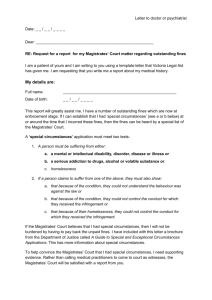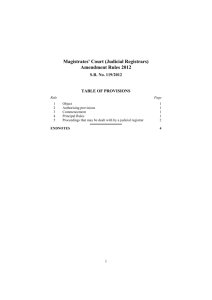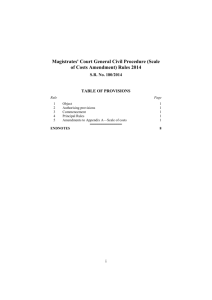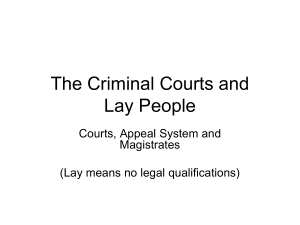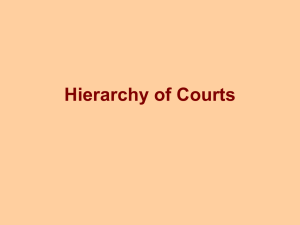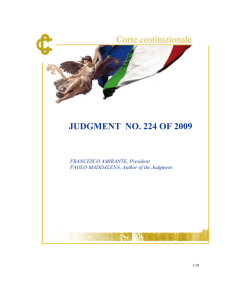Magistrates - Dr Peter Jepson
advertisement
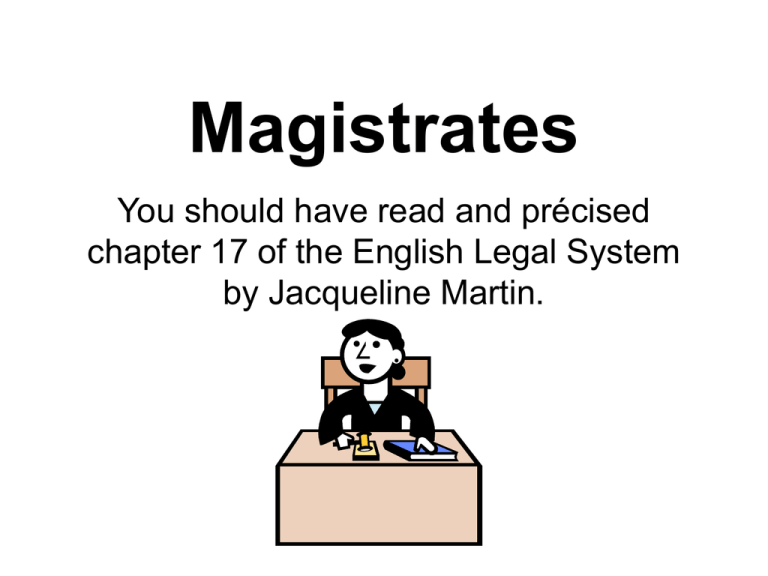
Magistrates You should have read and précised chapter 17 of the English Legal System by Jacqueline Martin. Who are lay people? • People without legal training, e.g. – Magistrates – Jurors – Lay members of tribunals • Why do lay people have such an important role in the English Legal System? Magistrates • Appropximately 29,000 sitting as part time judges. • Sit to hear cases as a bench of 3 magistrates. • District Judges (Magistrates’ Courts) are qualified lawyers who hear cases on their own. Qualifications • Age… – 18-65 on appointment. • Residence… – expected to live or work within local justice area to which they are allocated. • Six key qualities… Six Key Qualities… • Good character • Understanding and communication • Social awareness • Maturity and sound temperament • Sound judgment • Commitment and reliability Restrictions on Appointment as a Magistrate • Known criminals need not apply – True/False? • People who owe money – True/False? • People declared bankrupt – True/False? • Police Officers/Traffic Wardens –True/False? • Deaf people – True/False? • Teachers – True/False? Appointment • Advertisements… local radio, newspapers, magazines, on buses etc. • Local Advisory Committees: – Members usually current/ex-magistrates – 12 members (mix of magistrates and nonmagistrates) – Half members retire in rotation every 3 years Appointment • Selection process: – First interview… 6 key qualities/attitudes on criminal justice issues – Second interview… test judicial aptitude with discussion of case studies • Local Advisory Committees recommend suitable candidates to Lord Chancellor • Lord Chancellor appoints new Magistrates Training • Framework of training covers 4 areas of competence: – Managing yourself – Working as a team member – Making judicial decisions – Managing judicial decision-making • Produce a flow-chart of the stages of training. Justice’s Clerk • Every bench of Magistrates is assisted by a clerk. • What are the clerk’s duties? • Can the clerk assist the magistrates in their decision-making? Role and Duties • They sit for a minimum of 26 half days each year. • Magistrates deal mainly with criminal trials and issues around criminal cases. • However, Magistrates do have a civil jurisdiction as well. • Produce a list of Magistrates criminal and civil duties Retirement and Removal • Retirement age… 70 – Placed on the Supplemental List – Can carry out some administrative functions • Removal… s11 of the Courts Act 2003: Lord Chancellor can remove for – – Incapacity or misbehaviour – Persistent failure to meet standards of competence – Declining or neglecting to take a proper part in the exercise of his functions Advantages and Disadvantages Working in pairs establish a list of the advantages and disadvantages of having Magistrates. Create a group mindmap for advantages and a mindmap for disadvantages.

